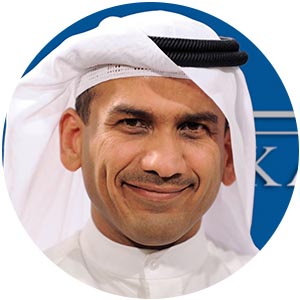Kuwait Financial Centre (Markaz) has been among the Arab region’s leading asset management and investment banking institutions since 1974. Speaking with Global Finance, CEO Manaf Alhajeri explains that economically challenging times have a bright side: a chance to find value for long-haul investors.

Global Finance: How will the decline in oil prices affect Markaz?
Alhajeri: While the fall in oil revenues will stress the economic system, it also opens up opportunities to assist corporates and institutions in terms of fundraising and restructuring. And while there will be pressure on stock prices, market valuations are beginning to look attractive to long-term investors. Markaz sees this as an opportunity to create alpha through the process of sector and stock picking.
GF: Is the recent heady growth of Kuwait’s banks sustainable?
Alhajeri: Liquidity in Kuwait’s banks is reasonably good, which will allow them to meet strong demand for infrastructure project financing and retail banking. According to Marmore MENA Intelligence [a subsidiary of Markaz], lower oil revenues have impacted the process of bank deposit mobilization in the Gulf Cooperation Council [GCC], as government deposits account for a sizable portion. The fall in deposit growth, coupled with governments drawing down their savings, has led to short-term pressures on the money market. Government debt, to which banks are the major subscribers, has been on the rise, which could crowd out the private sector and deprive [companies] of credit facilities.
GF: Do you expect Kuwait’s infrastructure surge to have a knock-on benefit for financial services?
Alhajeri: With the country proceeding with capital spending, despite prevailing macroeconomic conditions, Kuwait’s financial services sector is expected to benefit, as non-oil GDP rises. In the case of banks, an increase in infrastructure spending will lead to higher corporate lending, raising interest revenues and lowering loan-impairment charges. This is expected to increase asset quality and improve reserve coverage ratios. The current low-oil-price scenario could be utilized to develop a bond market, which in turn could help the banks and investment companies to float infrastructure bonds. Since infrastructure spending by GCC governments is expected to continue, sectors such as banking and construction are expected to benefit, and this will have a positive impact on some companies in the private sector.
GF: Has Markaz felt that impact?
Alhajeri: Our corporate finance activities have strengthened throughout 2015, with continued growth of announced and executed merger and acquisition transactions, and we have a strong pipeline. We have a clear edge in the region, thanks to years of capacity building in M&A, restructuring advisory services—either representing creditors or corporations—distressed-debt transactions liquidating noncore assets for our clients, and raising fresh capital.
GF: What makes Markaz’s financial solutions stand out?
Alhajeri: Our specialized know-how and access to a diverse network of institutional and high-net-worth investors enable us to design and structure innovative products with prudent asset class distribution and risk management, which leads to lower cost of capital. Investment companies such as Markaz can attract long-term capital to support the fiscal structure of the economy.



